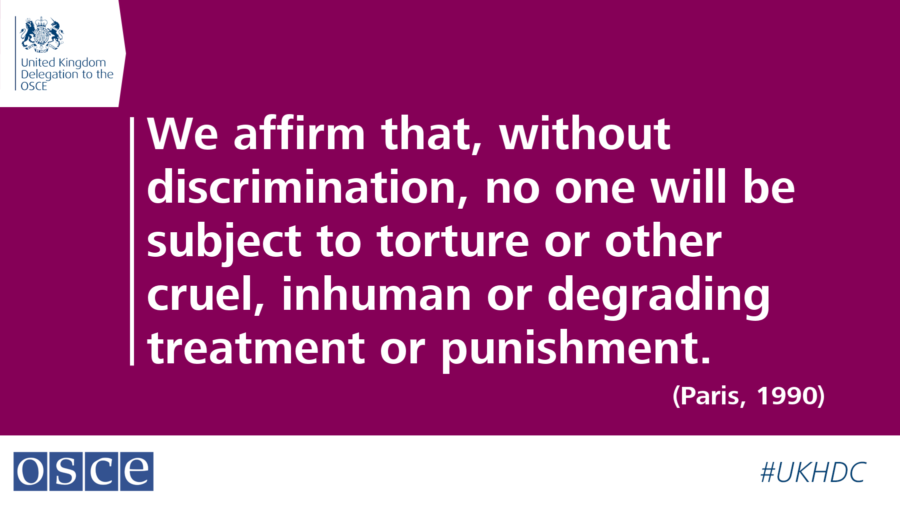28th March 2017
Not Just Someone Else’s Problem: Prevention of Torture

Over the past fortnight I have spent a lot of time reading and thinking about prevention of torture. As a diplomat my professional interest has largely related previously to relevant international conventions and to countries that disregard international obligation and use torture as a means of intimidation or coercion. As a UK citizen I have also taken an interest in how we respond to victims of torture from other countries in terms of safe haven and rehabilitation.
I have previously thought rather less about what international obligations mean domestically for all countries – including the vast majority of OSCE states – where the use of torture, cruel, inhumane and degrading treatment as state policy has been consigned to the history books.
Torture has a special place in international law – its prohibition is absolute, regardless of whether a state has ratified relevant international documents. States have an obligation not only not to use torture, cruel, inhumane or degrading treatment against those they detain, but also must have active measures in place to ensure that it does not take place.
Any place of detention can become a place where cruel, inhuman and degrading treatment can take place, if adequate safeguards are not in place and if staff and authorities are not fully aware of their own responsibilities.
The 1984 UN Convention against Torture and other Cruel, Inhuman and Degrading Treatment obliges states to educate officials involved in custody on the prohibition of torture. The 2002 Optional Protocol (OPCAT) offers practical means to make these political commitments a reality through international and national monitoring systems.
OSCE participating States have strongly and repeatedly condemned torture and other forms of cruel, inhuman or degrading treatment or punishment and committed to uphold its absolute prohibition (Copenhagen 1989, Paris 1990, Moscow 1991, Budapest 1994, Istanbul 1999, Ljubljana 2005, Athens 2009). It is seven years since Ministers from all OSCE states agreed to call on all OSCE states called on all States to give early consideration to becoming parties to the Protocol. So far 41 of the 57 OSCE States have ratified OPCAT and 39 have a National Preventative Mechanism in place.
In a small number of the OSCE states, grave allegations continue to surface of serious and intentional ill treatment of individuals in detention. The UK and a majority of OSCE states will continue to condemn such mistreatment in the strongest terms, call on the states concerned to desist, and work to convince them to change policy and practices. But at the same we all have a responsibility to make sure that we have taken every possible step to prevent abuse and mistreatment in our own detention facilities.
In this month’s meeting of the OSCE Human Dimension on 28 March I will be asking Delegations to share their progress on OPCAT ratification, exchange experience of operating National Preventative Mechanisms and think about whether we can do more to eradicate torture across the OSCE region. We will also remember the late Sir Nigel Rodley, who did so much to bring about the establishment of the Convention Against Torture. Sir Nigel dedicated a large part of his life to combating torture and other serious human rights violations, and is greatly missed by those working in this field.